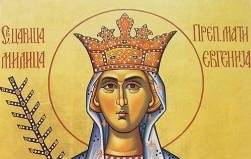
Venerable Evgenia-Ephrosinia - Serbian empress Milica
We dedicate this day to you, venerable mother Ephrosinia, and we offer you this service and sing a song.
(a letter about the Holy Empress Milica, Venerable Eugenia-Ephrosinia from Lives and liturgical songs)
Walk today, Serbian choirs,
let us gather in the holy temples
and let's celebrate solemnly
especially among Serbian ladies...
(little vespers; Glory be to the Lord)
Born around 1335, Milica was a descendant of the God-loving Serbian royal line Nemanjić, great-great-grandson of Vukan Nemanjić, daughter of the famous duke of Toplice Vratko Nemanjić, sung in folk songs as Jug Bogdan and wife of the Holy Great Martyr Emperor Lazar Hrebeljanović. ... generous, virtuous and wise, and in piety she was the leader of her family... Decorated with all virtues, reasonable, manly, merciful, generous, quiet and filled with every good nature; smart, energetic, and above all, pious and devoted to God" (Ava Justin; life of St. Eugenia-Ephrosinia).
Milica enriched her childhood with a Christian and secular education, being a frequent guest at the court of her cousin Tsar Dušan (1308-1355). She first met Lazar, her future husband, in her father's area, where she later built her endowment - the Ljubostinja monastery. With the blessings of Emperor Dušan and her father Vratko, she married Lazar in 1353. In an honorable and God-loving marriage, Lazar and Milica gave birth to five daughters: Mara, Dragana, Jelena, Teodora and Olivera, and then three sons: Stefan, Vuk and Dobrivoj (who died at birth).
Lazar Hrebeljanović (1329 -1389) was a famous duke, famous for his chivalry, honesty and shrewdness, and very loved and respected at the court of Emperor Dušan. Being such a man, the Lord also recognized him, revealed him, and gave him to the people as the guardian of God-loving and man-loving His commandments - the guardian of faith and fatherhood: You loved the beauty of the glory of God, you pleased Him among the earthly and you doubled the talent you received with good deeds". (tropar to the Holy Martyr Lazarus)
Another eyewitness of Lazarus' life, the nun Jefimija (Despotic Jelena Mrnjavčević), in a letter of praise, gives him more magnificence and ties with gold threads on red silk: Among the beauties of this world, you have been brought up from your youth, O! new Martyr, prince Lazarus, and the strong hand of the Lord showed you strong and glorious among all earthly lords. You reigned over the land of your fatherland, and in all good things you cheered up the Christians entrusted to you, and with a courageous heart and a desire for piety you went out against the serpent (i.e. the Turkish emperor Murat) and against the enemy of the divine Churches, reasoning that your heart could not bear to see where the Christians of the fatherland yours is ruled by the Ismailis". (Praise to Prince Lazar, Yefimija)
After the Battle of Kosovo, Lazarus' commitment to the Kingdom of Heaven and his martyrdom, his widow, the Christ-named mother of the entire Serbian race, taking "the zeal of a man" (Patriarch Danilo III), wisely and courageously ruled Serbia during the difficult times of Turkish vassalage.
Her contemporary Constantine the Philosopher. describes her personality in the most esteemed words: And the venerable and very wise Milica, who surpassed many chosen mothers, being left alone, was, as Solomon says, a manly woman and had all the virtues. Everyone around her knows that about her, who have received alms from her hand and many other good things. Having assumed such a great power, she also knew worldly matters, in which it is difficult to navigate. By her beauty and goodness, she was not only a woman, but also a wise Odysseus in many things. Who will tell all her deeds? Who will count all the divine and all holy decorations and gifts of her to churches and monasteries? Who will not be amazed by her pious attitude towards the monks, who are turned to the only God? She really exceeded the commandments with her actions and went forward to an ever greater work.
Milica received a promise from the Turkish sultan Bayazit that he would not persecute the Church of God and destroy temples, but on the condition that he give his youngest daughter Olivera as his wife. This wise mother thought: better to sacrifice one of her daughters than to lose many Serbian daughters and girls, churches and monasteries. She encouraged Oliver with the Lord and tried: not to renounce Christ - to save his soul. And Olivera, a martyr, a virgin, beautiful in physical beauty, and even more beautiful in spirit, a tame bee, level, in the nest of agarjan, worse than a wasp, faithful to the Lord and her mother's vow.
The son of the elder Stefan (1377-1427), who was only twelve years old after the death of Lazar, she taught with wisdom, tried with faith, hope and love, preparing him to inherit the throne of his father: She gave the sword of the famous Lazar to her son Stefan Visoko (tropar of St. Ephrosinia) . Being God-fearing, unafraid of evil, he showed himself to be the best ruler, knight, military leader and writer, and even more as God-loving and man-loving: You showed yourself as a strong bulwark to your suffering family, Stephen the Wise, and you followed in the deeds of your imperial parents, decorating the homeland with many churches. You remained in the faith of our Holy Fathers, in it you do not stop strengthening us, with your prayers, before the throne of the Most High God (Troparion of Saint Stephen).
You wholeheartedly followed Lazareva's true patriotism and patriotism, but before that the commanded love of God and brotherhood; that's why we sing you as a cheerful executor of the Lord's commandments, Milice pravohodna (canon two, song three). As the mother of the entire Serbian race, only when she has fed and watered the hungry and thirsty, healed the sick, clothed the naked, protected the weak, comforted the poor, showered churches and monasteries with gifts, having handed over the kingdom to her son Stefan the righteous and wise, will she go to her endowment, the Ljubostinja monastery , which he raised before the battle of Kosovo, and received the monastic tonsure in 1393, and with the tonsure the monastic name Evgenia: Having taken off the imperial clothes, you put on the monastic robe, Evgenia the Glorious (tropar of St. Ephrosinia).
Her ascetic life is joined by many Serbian widows of fallen Kosovo heroes. Among the widows was Jelena, the wife of despot Jovan Uglješa Mrnjavčnjević, the latter's nun Jefimija, Miliča's cousin, spiritual sister, fellow ascetic and companion, who also classifies herself as a "wise girl". Yefimija was the first Serbian poetess and embroiderer known for the famous eulogy she wrote and embroidered to Tsar Lazar after his martyrdom.
From the Ljubostinja monastery, Evgenija continues to take care of her son, the despot Stefan, the Serbian land, the Orthodox faith, first of all offering prayers, and all for the sake of preserving the Serbian Christ-like identity: And you took the Cross of Christ as a sword of spiritual victory, for the salvation of your soul and the Serbian God-bearing race (tropar of Saint Ephrosinia). And Milica reached for the pen, in her hands like a sharp sword, the sword of truth and justice, to cut down every evil that befell the Serbian race, and from her Christianized being, as if from a quiver, she drew prayer verses that carry the strength of the Psalms of David:
Praise to Tsar Lazar
(To the widow of my bridegroom - preserved part of the eulogy)
Who is this?
Speak into my ears.
Is he a bachelor before?
my decoration, my scattered children gathering?
Is this someone out of envy?
the enemies wanted to overthrow
and the light of my sight as a dungeon
keep in dark dungeons,
and they couldn't?
Is this my widow's husband?
Come, O bridegroom, come,
and give to those who do me harm
according to their works,
because they did not understand your coming
to my help.
Grab your weapon and get up and don't be late!
Drive sharpened arrows into their hearts,
which sharpened for me, lawless.
In addition, I do not tolerate the taunts of those on me.
With how many hateful sacrifices they defiled me!
Come, avenge me with your blood.
Come, give me my support.
Gather my lost child,
which the devils envy
they tore me away.
Gather them in my fence,
look after my child,
lest the wolf eat of my flock,
not to disperse them with his envy,
like before, when you wouldn't be with them.
Not to fall asleep around you.
That your legs don't get weak.
Feed my flock, which I gave you.
Banish the lawless barbarians from them.
So that you don't stop fighting them
for me and my flock.
Rejoice, my eye.
which never sleeps, O Lazarus.
And I go up to the first one again.
Lazarus, who outshines all the stars by shining,
Lazarus appropriation by foreigners,
preacher of the Trinity,
a liberator to the captives.
Lazar is an unshakable pillar of the church,
sick doctor, naked clothes,
Lazar inocima voivode krapak
na bese and savior.
Rejoice, O Lazarus,
I sing it apostolically,
and I say again: rejoice.
Rejoice, hide who is ours
sprouted from thorns,
We cannot defeat soldiers with weapons.
Rejoice, teacher of hermits.
Rejoice, Lazarus, to those who sail
steerage and quiet dock.
Rejoice, avenger of the offended
and liars to the shaper.
Rejoice, comforter of weeping,
and to the poor defender, and to my naked clothes.
Rejoice, strong and beautiful,
and widows to the foster carer.
Blessed are you indeed, O Lazarus,
bless me who blesses you.
There is no praise you are not worthy of,
But the mind is exhausting...
Full of the Spirit of God, you had the audacity before Bayazit... to confess the Holy Trinity: the Father and the Son with the Holy Spirit... (canon, first song of the Glory). From the Ljubostinja monastery, as a nun, Evgenia, together with Yefimija, went before Bayazit to beg for the pardon of her falsely slandered son Stefan and to look for the relics of Saint Petka Srpska, offering the sultan all her wealth. The Sultan laughed at her demand and said in wonder: "Why don't you ask for something more precious than just those dry, immobile bones?". All joyful in Christ, with the relics of Saint Petka, from Vidin they made a prayer entrance through Serbia and laid them first in the Županjevac monastery, then in Ljubostinje, so that after her death in 1417 they were transferred to Belgrade.
Before the end of her earthly life, she took on the great shima and the name of Efrosinia, and not long after, she presented herself to the Lord in a great feat and peace on November 11, 1405. Her famous holy and miracle-working relics are stored in her temple, where they are still today: Your body, as the abode of the Spirit and miracle-working, in the great church of Ljubostinje, and now pours out healing to all who come to you, and with faith call on your name, Mother Ephrosinia, and heavenly soul (ninth song of the canon, third verse).
Over her holy relics, miracles, healings and spiritual strengthenings still happen quietly, almost imperceptibly, but inevitably, and we call her "the silent helper" for a reason: Therefore, God bless your name and your grave, holy saint, Evgenia, all-praiseworthy: to all the sick for healing and to all the faithful to salvation (cond. of St. Ephrosinia).
Archpriest Danijel Stefanović
Source: Diocese of Kruševac
PHOTOS
RELATED ARTICLES
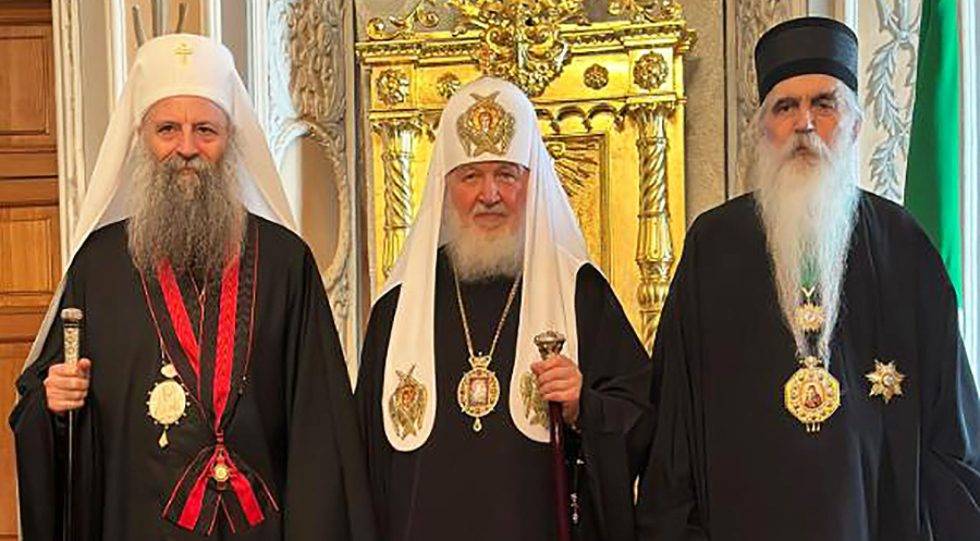
Patriarch Porphyry Awarded the Order of the Holy Equal-to-the-Apostles Prince Vladimir
After the Divine Liturgy in the Assumption Cathedral of the Trinity-Sergius...
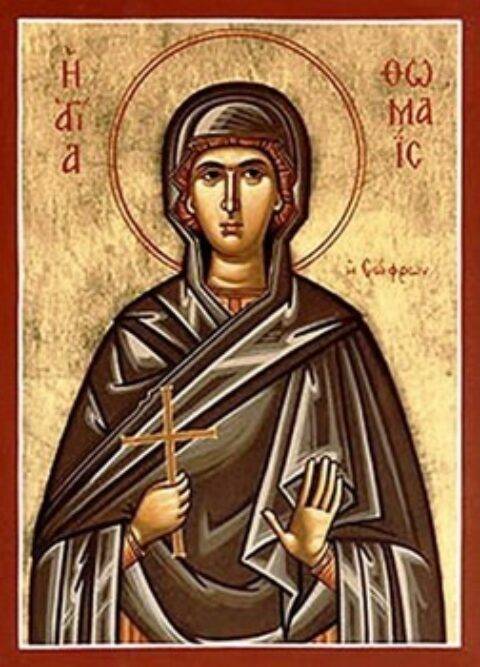
Calendar for April 26 Holy Martyr Thomais
Born in Alexandria of honorable parents; taught piety from a young age and at...
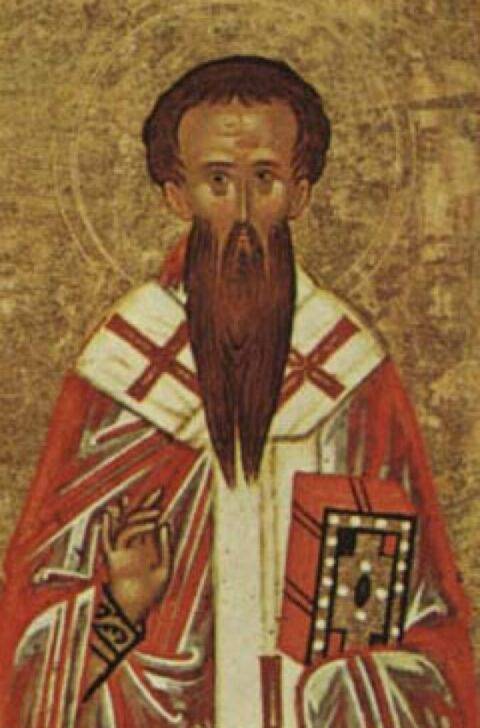
Calendar for April 25 Saint Basil the Confessor – Eastern Friday
A companion and martyr of Saint Procopius the Decapolis. Basil faithfully...


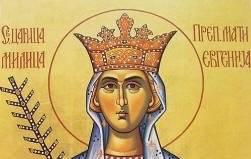

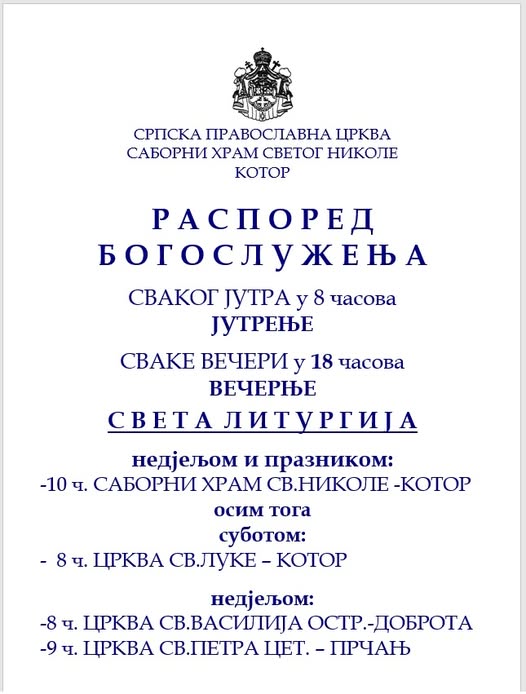
.png)